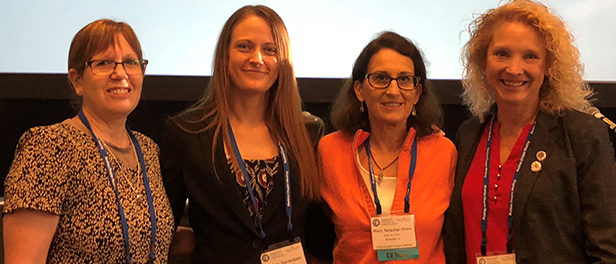 Welcome to the Utah Chapter of the American College of Cardiology
Welcome to the Utah Chapter of the American College of Cardiology Welcome to the Utah Chapter of the American College of Cardiology
Welcome to the Utah Chapter of the American College of Cardiology From Left: Sharon Dickinson PA-C, AACC; Teshia Sorensen PharmD, BCPS, AACC and CV Team State Liaison of the Utah Chapter of the American College of Cardiology; Marci Farquhar-Snow, NP, AACC; Nancy Lundy, NP, AACC
From Left: Sharon Dickinson PA-C, AACC; Teshia Sorensen PharmD, BCPS, AACC and CV Team State Liaison of the Utah Chapter of the American College of Cardiology; Marci Farquhar-Snow, NP, AACC; Nancy Lundy, NP, AACC
|
Ed Miner, MD, FACC Utah, Chapter President ACC Governor, Utah |
 Please join your cardiology colleagues at the ACC Rockies Chapter Meeting in Park City, Utah for updates on ACC affairs, the potential new CV Board, and clinical topics such as Genetic and Sports EP, plus a discussion on the growing role of obesity medications in heart failure, and the first-ever Cardiology State-of-the-State report. There will be many opportunities for networking, as well!. For more information and to register, please visit:
ACC Rockies Chapter Meeting 2025
Please join your cardiology colleagues at the ACC Rockies Chapter Meeting in Park City, Utah for updates on ACC affairs, the potential new CV Board, and clinical topics such as Genetic and Sports EP, plus a discussion on the growing role of obesity medications in heart failure, and the first-ever Cardiology State-of-the-State report. There will be many opportunities for networking, as well!. For more information and to register, please visit:
ACC Rockies Chapter Meeting 2025
ACC Live Courses For a listing of all ACC Live Courses please visit: https://www.acc.org/education-and-meetings/meetings |
 Latest in Cardiology from ACC.org
Latest in Cardiology from ACC.org
- Patients With Prior GIB Undergoing LAAO More Likely to Suffer Future Bleeding | NCDR StudyPatients with prior gastrointestinal bleeding (GIB) undergoing left atrial appendage occlusion (LAAO) were more likely to experience in-hospital complications and long-term GIB and major bleeding, according to a study recently published in JACC: Clinical Electrophysiology.
- ACC CardiaCast: Heart Vision: Imaging and the 2025 ACC Pathway for Tricuspid RegurgitationIn this episode of Heart Vision, Dr. Purvi Parwani sits down with Dr. Rebecca T. Hahn, a leading expert in valvular heart disease and advanced cardiovascular imaging.
- Studies Examine Current Treatments and Trends For Peripheral Vascular InterventionsTwo studies published Nov. 10 in JACC: Cardiovascular Interventions examine current treatment options, outcomes and trends for peripheral vascular interventions (PVIs).
- ACC CardiaCast: Debunking Reasons for Delayed HF Treatment: BP Too Low (No Such Thing!)In this episode, Keith C. Ferdinand, MD, FACC, discusses why low blood pressure (BP) should not delay heart failure (HF) treatment.
- Governance in Action: Updates From ACC's October Board of Trustees MeetingACC's October Board of Trustees (BOT) meeting was rich with strategic dialogue and forward-looking initiatives that reflect our shared commitment to advancing cardiovascular care and strengthening the ACC community.
